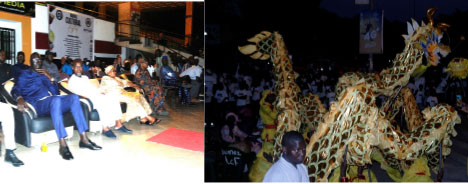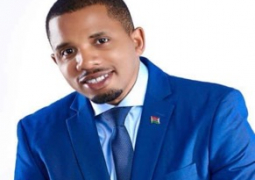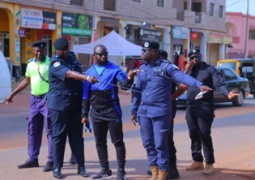
The commencement held on December 25, 2024, at the iconic Arch 22 (Never Again Arch), the weeklong festival celebrates the country's diverse traditions, cultural expressions, and unity, providing a platform for music, dance, art, and cuisine.
VP Jallow emphasised that the event underscores Gambia’s welcoming spirit and diverse cultural roots.
The Vice President also shared historical insights, noting that Banjul, formerly known as Bathurst, was once the capital of Christmas and New Year festivities along West Africa's Coast. Families from neighbouring regions, including Freetown, Sierra Leone; St. Louis and Kaolack, Senegal; and Accra, Gold Coast, would travel to Banjul during the holiday season. The cultural melting pot of Bathurst led to hybrid performances and masquerades like Hunting, Egungun, Makalo, and Zimba, reflecting the diverse ethnic groups in the region.
VP Jallow explained that by the mid-1950s, Bathurst had earned the title of “Capital of Yuletide” along the West Coast. Despite a decline in the city’s population over the years, the traditions of masking and performances continue to be cherished today. The Vice President credited the current government’s commitment to supporting freedom of expression and artistic freedom, which has contributed to the growing celebration of these traditions in recent years.
The Banjul New Year Cultural Festival aligns with the objectives of the Gambian government, led by President Adama Barrow, to promote culture as a means of fostering unity and building bridges among Gambian communities. The festival also supports the YIRIWA Development Project (2023-2027), which aims to strengthen Gambian identity and stimulate the economy through youth employment in sectors like tourism and entertainment.
In his speech, VP Jallow expressed that the festival acts as a vessel for growth, happiness, and friendship, emphasising the importance of cultural initiatives for national development. He also highlighted the government’s ongoing efforts to preserve and promote Gambia's cultural heritage, mentioning the ratification of two UNESCO Conventions in 2022. The Vice President noted that the National Centre for Arts and Culture (NCAC), with UNESCO’s support, had completed an inventory of Banjul’s built heritage and trained local youth to engage with visitors, further demonstrating the government’s commitment to cultural preservation.
VP Jallow also praised the Minister for Tourism, Arts and Culture, Honourable Abdoullahi Jobe, for his innovative approach to organising the festival. He acknowledged the Minister's personal efforts in securing funding for the event and his leadership in forming a task force in early 2024 to ensure the festival’s success. The task force, comprising various cultural groups, government bodies, and other stakeholders, met monthly to ensure a well-organised and safe event for all.
Minister Abdoullahi Jobe in his address, welcomed guests and provided an overview of the collaborative efforts that went into organising the festival. He emphasised the potential of the festival to attract both international visitors and Gambians from the Diaspora, fostering regional integration and promoting peace and reconciliation among the country’s communities. He noted that the festival’s celebration of shared traditions could be a powerful tool for strengthening social cohesion.
Earlier, Lord Mayor of Banjul, Rohey Malick Lowe, and the Executive Coordinator of Banjul, Ebrima Jawo, the Chairman of the Banjul Cultural Festival among other dignitaries delivered speeches at the opening of the festival.
Other attendees included the Minister for Foreign Affairs, members of the diplomatic corps, Banjul National Assembly members, councilors, deputy mayor, senior government officials, and representatives from cultural groups. A vibrant array of performances was presented, including Chinese Kung Fu Wushu by The Gambia, traditional hunting groups, and music by the renowned Joluv Band.
The Banjul Cultural Festival, which runs until January 1, 2025, is an important addition to Gambia’s cultural calendar. It provides an opportunity to celebrate and preserve the country’s unique traditions while promoting unity and economic growth through cultural tourism.




